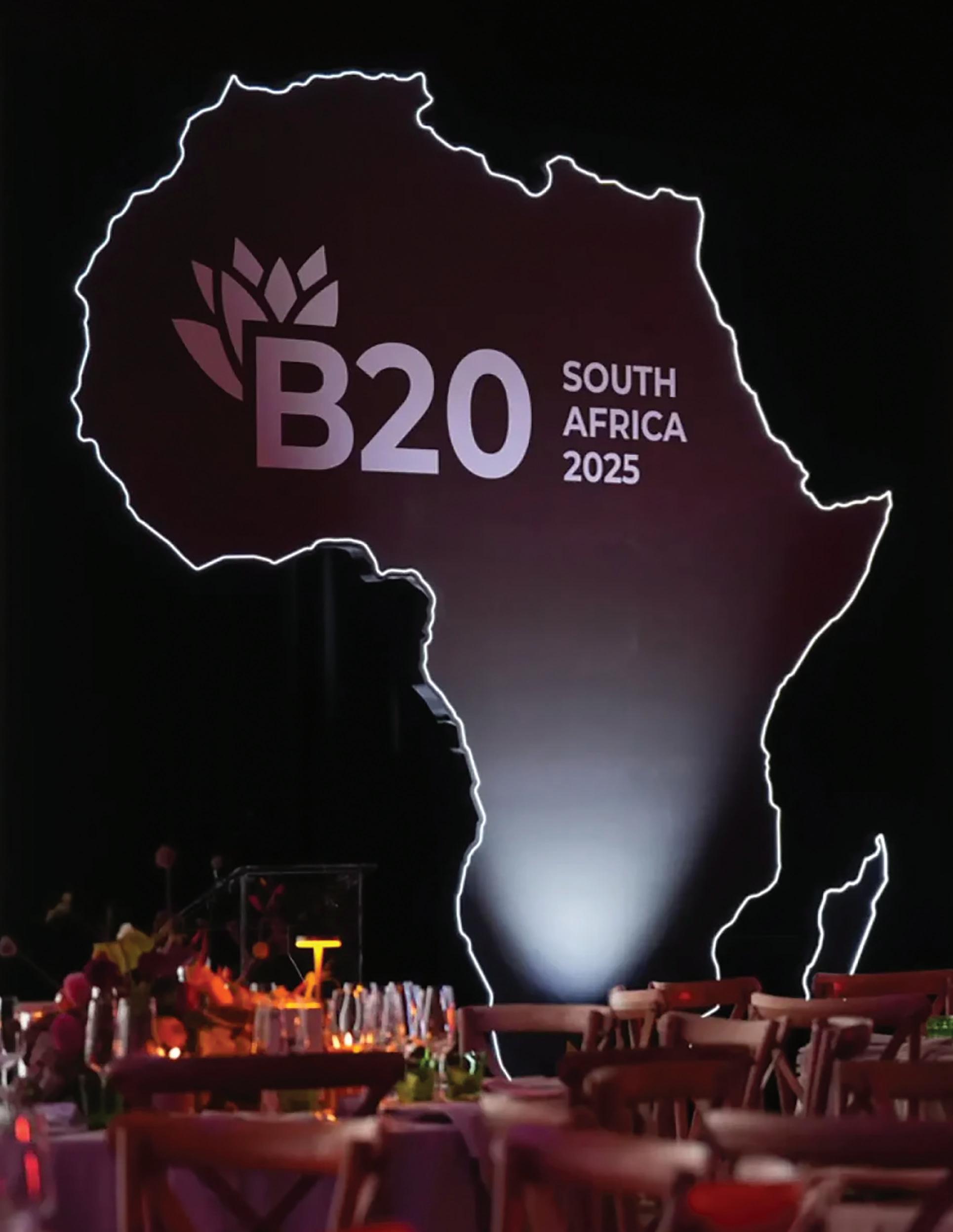
10 minute read
How connected buildings can help mitigate climate change
We can collectively help accelerate the rate of building renovation
In the European Union and the United States, major policies are defining efforts to reduce greenhouse gas emissions and achieve energy efficiency.
The European Climate Law, for example, establishes a goal of net zero greenhouse gas emissions by 2050 and includes legal requirements for EU countries to set intermediate targets for reducing emissions. In the United States, the Inflation Reduction Act commits to achieving a 40% reduction in economy wide GHG emissions by 2030.
As the momentum for achieving net zero economies increases, building renovation has emerged as a central emphasis due to several factors:
• Building operations, the building construction industry, and building and infrastructure materials generate 40% of annual global GHG emissions
• According to the US Department of Energy, residential and commercial buildings use about 40% of the nation’s energy for lighting, heating, cooling, and appliances while commercial buildings consume 70% of all electricity
• In Europe, the buildings sector consumes 40% of the continent’s energy demand.
• Building materials such as concrete, steel, and aluminum lock carbon emissions in place and contribute 23% of the total global CO2 emissions per year
• Projections indicate that the largest wave of building growth will occur from 2020 through 2050
Building renovation offers an environmental and economic way forward
Several methods exist for increasing energy efficiency and reducing the carbon footprint of commercial buildings. Design optimization based on reducing carbon emissions minimizes the use of materials that embody carbon and transitions to integrating sustainable materials or decarbonized conventional materials into building designs. Using recycled materials reduces the carbon footprint of buildings. Advanced connected and interoperable technologies allow equipment and systems to communicate with one another and conserve energy while meeting the lighting, security, safety, cooling, and heating needs of residents. For example, Installing LED lighting systems and then connecting those systems to other building control systems reduces energy consumption and costs.
Upgrading buildings for reduced environmental impacts also produces a promising economic outlook for commercial property owners. Renovations focused on green buildings that include replacing outdated lighting fixtures with connected lighting systems, installing energy-efficient HVAC systems, and using low-carbon building materials reduce energy costs. In turn, improving indoor environmental quality and sustainability promotes the health and well-being of employees and residents. Sustainable, human-centric workplaces attract tenants and respond to the expectations of staff returning to the office.

Green building projects produce higher economic returns
Certainly, a building renovation project requires an investment. However, improving the energy efficiency and occupant satisfaction of a property can yield a higher return-on-investment.
Several analyses of new green building and renovation projects compared to standard construction practices show a higher ROI within a shorter time span. Profitability increases through improved energy efficiency and decreases operating costs. The ability to attain healthy/green building certifications demonstrates the commitment to sustainability that tenants, clients, and employees seek.
Sustainable finance options offset |the challenges of acquiring the capital needed for green building and renovation projects. Blended financing allows owners to increase the scale of projects while controlling risk. Building owners may also implement renovation plans through innovative financing methods that include light-as-a-service

(LaaS), energy-efficiency-as-a-service (EEaaS), and energy services company (ESCO) models. Each addresses market barriers, enables energy efficient technologies through monthly payments rather than large up-front capital costs, and encourages owners to invest in energy efficiency without immediately receiving the benefit.
Mitigating climate change requires an immediate response and long-term planning
As the consequences of climate change become more apparent each day, the level of urgency—and uncertainty— increases. Mitigating the effects of climate change requires commitment from every individual, corporation, and government. While international policies set long-range targets for achieving net zero economies, efforts to reduce carbon emissions and energy consumption must continue and increase. As a result, construction companies must commit to replacing materials that contribute to emissions sustainable building materials.
Encouraging this commitment begins with increased resolve at the corporate level to reduce emissions through green building renovations and new building designs.
Interoperable, connected technologies offer a solution for reducing greenhouse gas emissions and energy consumption. Within those technologies, LED lighting systems serve as the starting point through flexible design options, low operating costs, and excellent heat dissipation. The capabilities offered through LED lighting systems that connect with other building operations allow design teams to create sustainable office environments that appeal to tenants and occupants. Focusing on such critical solutions at COP28 can help accelerate climate change mitigation. ■
To learn more about how connected technologies align with global energy policies, read our white paper Good connectivity: A key to decarbonizing the building sector.
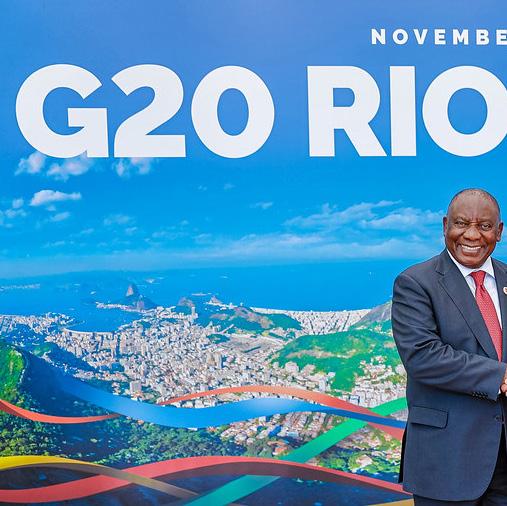
PREVIEW TO G20, B20 & W20
Johannesburg,
South Africa
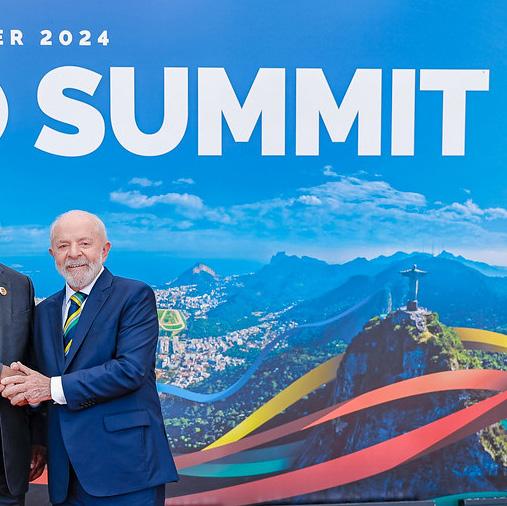

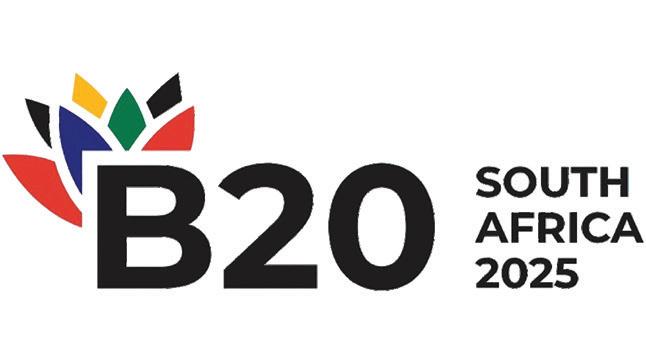
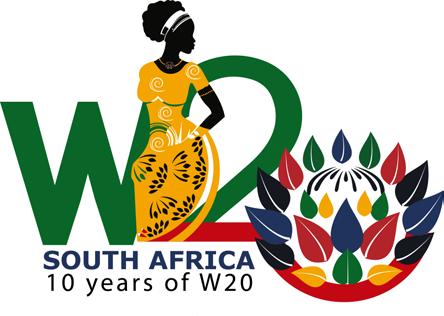
Africa’s G20 Presidency follows on the heels of Brazil’s very successful G20 Presidency last year and takes place ahead of the G20 Presidency of the United States of America in 2026.
As a leading forum for international economic cooperation, the G20 plays an important role in shaping and strengthening global architecture and governance on major international economic issues.
For the first time in its history, the G20 is being hosted on the African continent following the admission of the African Union as a member of the G20.
This is a moment of great significance for South Africa, the African continent and the world in that it was in Africa where humans developed the capacity and the impulse for cooperation.
Cooperation has been one of the key markers of human development touching on many aspects of life, from survival and social organisation to technological and cultural progress, which is what the G20 was established for. To foster cooperation to deal with the challenges the world faces. Cooperation is the bedrock of human civilisation.
Without cooperation and collaboration – between individuals, groups, peoples, nations – humanity cannot progress.
As we confront the challenges of the 21st century – from climate change to pandemics, from poverty to terrorism, from migration to artificial intelligence –we are again called upon to harness that most powerful, and that most enduring, of human attributes: mutually beneficial cooperation and collaboration.
This is a time of rising geopolitical tensions, unilateralism, nationalism, protectionism, isolationism, rising debt levels affecting poor countries in the world and a declining sense of common purpose.
Yet, this is a moment when we should be standing together as a global community to resolve the problems that confront humanity by ending the wars and conflicts that are causing such hardship and misery to many people around the world.
We are called upon by the exigency of the moment to act together with greater urgency to halt the destruction of our planet. This is a moment when we should harness the abundant resources we collectively possess and the remarkable technologies that human ingenuity has produced to overcome poverty and inequality,
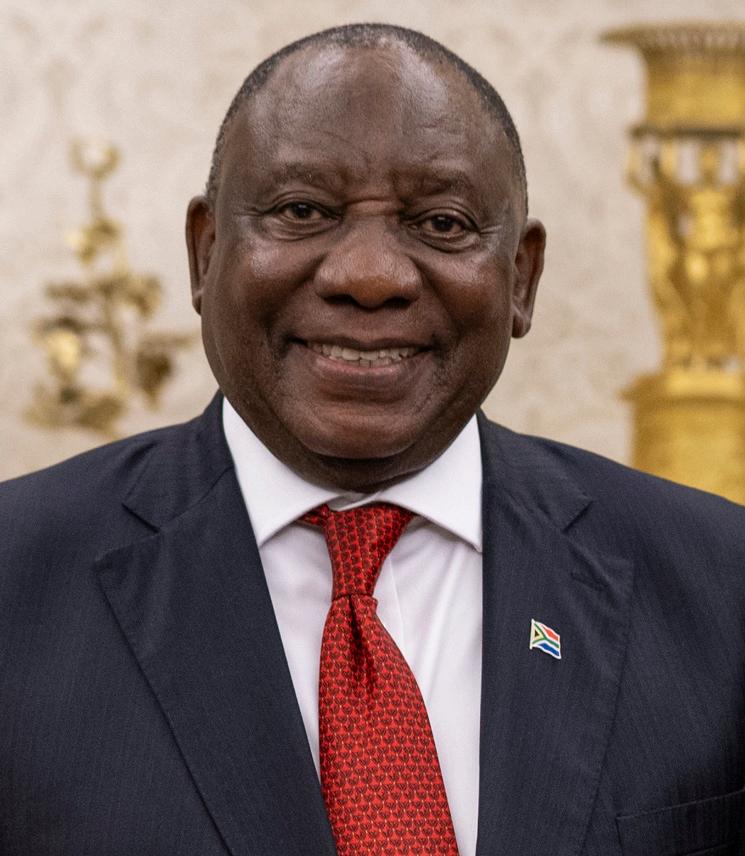
Message
President Cyril Ramaphosa
World Economic Forum on South Africa’s G20 priorities
Davos-Klosters, Switzerland, 21 January 2025 unemployment, especially youth unemployment, and the abuse of women, once and for all.
Thirty-three years ago, the founding president of democratic South Africa, Nelson Rolihlahla Mandela, spoke here at Davos.
He said:
“Our interdependence, bringing us together into a common global home, across the oceans and the continents, demands that we all combine to launch a global offensive for development, prosperity and human survival.”
In pursuit of this objective – and in giving effect to the mission of the G20 –South Africa will focus its G20 Presidency on three themes: solidarity, equality and sustainable development.
It is South Africa’s firm view that these themes can best be taken forward through the collective actions of institutions like the G20 and various multilateral institutions of the world, especially the United Nations, the WTO and global financial institutions which should be reformed and be more representative and responsive to the needs of the citizens of the world.
We will seek to get the G20 to focus more on how we can enhance solidarity through collective efforts to ensure that in the pursuit of progress for all, no person and no country is left behind.
The rights and freedoms of one people cannot be separated from the rights and freedoms of all peoples.
This is the foundation on which solidarity is built.
One of the greatest impediments to growth, development and stability is the persistence of inequality within and between countries.
The pursuit of the UN Sustainable Development Goal on reducing inequality is as much of an economic imperative as it is a social imperative.
As the G20 we need deliberate and coordinated efforts to focus on inclusive growth based on responsive trade and investment to grow the incomes of poor nations and the poorest in society and to ensure equal access to opportunities especially for women and young people.
For nations to flourish, equality and prosperity must be available to everyone – regardless of gender, race, religious beliefs or economic status.
Cooperation has been one of the key markers of human development touching on many aspects of life, from survival and social organisation to technological and cultural progress.
In addition to huge gaps in economic capabilities and levels of human development, countries of the Global South face a lack of predictable financing for development and climate change, high levels of debt and vulnerability to pandemics.
Debt sustainability for low-income countries is one of the four priorities of South Africa’s G20 Presidency.
In the world we inhabit today, the pursuit of equality and the practice of solidarity cannot be separated from sustainable development.
We need to meet the needs of the present without compromising the ability of future generations to meet their own needs. It is therefore in the interests of all countries to act with greater urgency to reduce global emissions – and for industrialised countries to support the climate actions that poorer countries must necessarily take in line with and support of decisions of UN climate change summits.
Another of South Africa’s priorities for its G20 Presidency is therefore to mobilise finance for a just energy transition.
We will seek agreement on increasing the quality and quantity of climate finance flows to developing economies as agreed at various UN climate change summits.
We will continue to call on global financial institutions on the redirection of Special Drawing Rights, which are left unused.
It is simply not fair that over 60 percent of Special Drawing Rights go to a handful of wealthy countries.
These drawing rights should be redirected to enable countries in Africa and other parts of the Global South to realise their developmental aspirations – to enable them to invest in infrastructure, in industrial development, in education and training, and in health care.
We need to leverage private capital and use innovative forms of finance and taxation to raise additional resources for sustainable development.
Global finance institutions should derisk and support more financing for emerging and developing economies.
We need to support country initiatives aimed at addressing climate change, such as the Just Energy Transition Partnership that South Africa has entered into with a number of countries of the Global North.
As we accelerate the transition to lowcarbon economies in a manner that is just and inclusive, we must recognise the damage that climate change has already wrought. And will continue to wreak.
In light of this, South Africa has therefore made the strengthening of disaster resilience as another of the priorities of its G20 Presidency.
The increasing rate of climate-induced natural disasters is affecting countries that can least afford the costs of recovery and rebuilding.
In order to address this, special financing and insurance mechanisms must be made available to scale up funding for postdisaster reconstruction.
Since the dawn of the industrial age, the benefits to humanity of economic growth have been achieved at the cost of environmental destruction.
If we are to survive and thrive as humanity, we must change this.
We must pursue development pathways that reconcile growth with urgent climate action.
Another of South Africa’s priorities for its G20 Presidency is to harness critical minerals for inclusive growth and development.
We need a G20 framework on green industrialisation and investments to ensure progress towards a grand bargain that promotes value addition to critical minerals close to the source of extraction.
We also need the development of low carbon manufacturing value chains which can support decarbonisation and industrial development.
There is a need to promote beneficiation and local value addition of resources at source resulting in an additive rather than an extractive relationship.
As minerals extraction accelerates to match the needs of the energy transition, the countries and local communities endowed with these resources must be the ones to benefit the most.
We will use this G20 to champion the use of critical minerals – through a programme of green industrialisation – as an engine for growth and development in Africa and the rest of the Global South.
As this will be the first G20 summit held in Africa, it is a valuable platform to demonstrate Africa’s promise.
Many agree that Africa is the next frontier of global growth and productivity.
The African continent has an unrivalled natural resource endowment, with the youngest population of all continents.
Africa continues to be an expanding market for goods and services.
The African Continental Free Trade Area has the potential to change the economic and social fortunes of the continent.
We will seek G20 support for the AfCFTA Adjustment Fund that will enhance inclusive growth, sustainability and regional integration.
We will look to consolidate various G20 initiatives related to Africa into a flagship agreement for cooperation focused on implementation of investments in productive sectors in Africa in areas such as infrastructure.
An infrastructure revolution is propelling Africa’s growth.
We seek investments in the development of skills for Africa’s youth and the economic empowerment of its women.
In the health sector we would want the G20 to support the production of pharmaceutical products such as therapeutics and vaccines to deal with pandemics.
The digitisation of the continent to enhance trade and development is a ey enabler.
Through its G20 Presidency, South Africa is well-positioned to advance global cooperation and build partnerships for growth and development.
South Africa has a rich history of nclusive dialogue and common action.
Over the last few years, the South African government has been working closely with social partners in business and in labour to address key national challenges and drive inclusive growth.
This cooperative culture and approach were taken to a higher level with the establishment of the Government of National Unity following the elections we held in May last year.
The Government of National Unity, made up of ten political parties, has been vital to stability and inclusive governance, and has contributed to greater interest among investors in South Africa’s economic prospects.
The seeds of human progress were sown in Africa.
In Africa, the earliest forms of cooperation were forged and developed.
As the leaders of the G20 return to Africa, we make a call that we all harness these essential capabilities that will make us take action to build a better and fairer world.
We intend that the G20 in Johannesburg this year should be a forum where cooperation and collaboration amongst the leading economies in the world will be taken to a higher level.
Acting together, we should build an inclusive, just and equal world in which all may prosper, leaving no one and no country behind.
I look forward to welcoming you to the G20 in Johannesburg later this year.
Even if you do not participate in any of the 130 G20-related meetings, I invite you to come and see South Africa for yourself, the most beautiful country in the world.■
